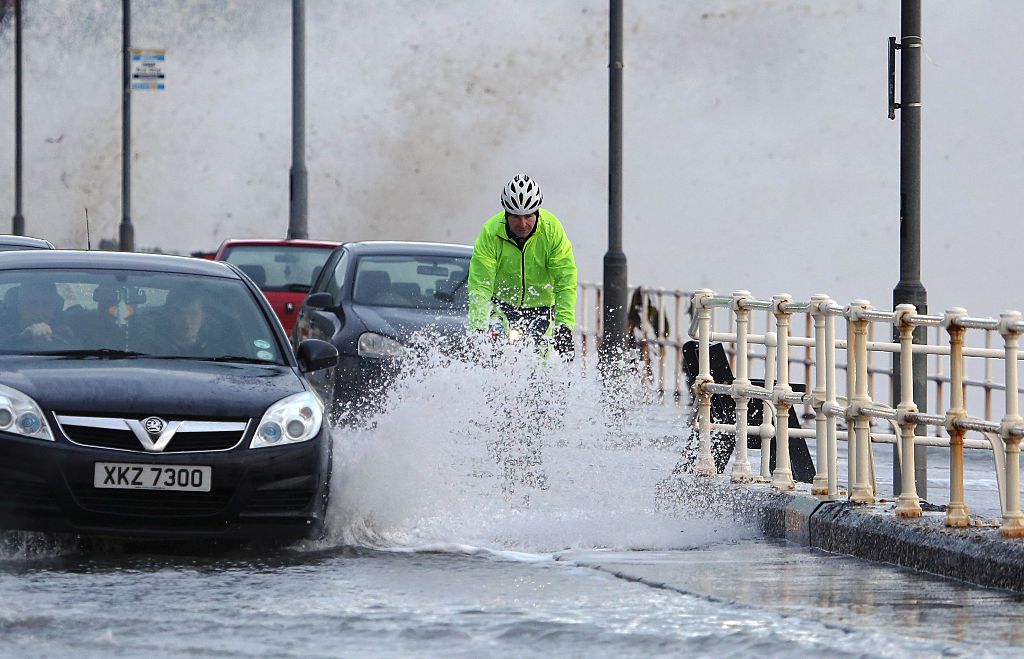Ocean levels are rising much faster than at any time in 28 centuries, sobering new studies show


A free daily email with the biggest news stories of the day – and the best features from TheWeek.com
You are now subscribed
Your newsletter sign-up was successful
The Earth is exiting a long period of stable ocean and climate levels during which human civilization grew and flourished, and it's almost certainly due to human activity, scientists in the U.S. and Germany said in a pair of papers published Monday in the journal Proceedings of the National Academy of Sciences. One study, led by Rutgers climate scientist Robert Kopp, mapped out changes in sea levels around the globe over the past 2,800 years; oceans rose or fell no more than 1.5 inches a century from ancient Rome's founding until the Industrial Age in the 1800s, the study found, but rose 5.5 inches in the 20th century alone, accelerating to a rate of 12 inches a century by 1993.
The researchers blamed the increasing sea levels on rising global temperatures they and almost all other scientists attribute to the burning of fossil fuels. "Physics tells us that sea-level change and temperature change should go hand-in-hand," Kopp said. "This new geological record confirms it." Kopp and his team estimate that sea levels will rise 22 to 52 inches by 2100 at the current rate, or 11 to 22 inches if nations fully enact the global climate change treaty negotiated in Paris last year.
The second paper, led by Matthias Mengel of Germany's Potsdam Institute for Climate Impact Research, similarly estimated that sea levels will rise three to four feet by 2100 if humans don't curb carbon emissions — roughly the same range predicted in 2013 by the United Nations Intergovernmental Panel on Climate Change. Both papers acknowledged that there were significant unknowns in their analyses, but not in a way that should make humanity in general and coastal dwellers in particular feel any safer: If the massive ice sheets of Greenland and Antarctica melt, as seems likely, most bets are off.
The Week
Escape your echo chamber. Get the facts behind the news, plus analysis from multiple perspectives.

Sign up for The Week's Free Newsletters
From our morning news briefing to a weekly Good News Newsletter, get the best of The Week delivered directly to your inbox.
From our morning news briefing to a weekly Good News Newsletter, get the best of The Week delivered directly to your inbox.
If that seems distant and theoretical, a third, unpublished study released Monday found that rising temperatures are responsible for a sharp increase in "nuisance floods" in seaside towns along the southern U.S. East Coast over the past 50 years, causing millions of dollars of damage due to incursions of a few feet of saltwater. Most of those floods wouldn't have happened without manmade global warming, the team, from Climate Central, reported. "I think we need a new way to think about most coastal flooding," said lead author Benjamin Strauss. "It's not the tide. It's not the wind. It's us. That's true for most of the coastal floods we now experience."
A free daily email with the biggest news stories of the day – and the best features from TheWeek.com
Peter has worked as a news and culture writer and editor at The Week since the site's launch in 2008. He covers politics, world affairs, religion and cultural currents. His journalism career began as a copy editor at a financial newswire and has included editorial positions at The New York Times Magazine, Facts on File, and Oregon State University.
-
 Sepsis ‘breakthrough’: the world’s first targeted treatment?
Sepsis ‘breakthrough’: the world’s first targeted treatment?The Explainer New drug could reverse effects of sepsis, rather than trying to treat infection with antibiotics
-
 James Van Der Beek obituary: fresh-faced Dawson’s Creek star
James Van Der Beek obituary: fresh-faced Dawson’s Creek starIn The Spotlight Van Der Beek fronted one of the most successful teen dramas of the 90s – but his Dawson fame proved a double-edged sword
-
 Is Andrew’s arrest the end for the monarchy?
Is Andrew’s arrest the end for the monarchy?Today's Big Question The King has distanced the royal family from his disgraced brother but critics claim a ‘fit of revolutionary disgust’ could still wipe them out
-
 Earth is rapidly approaching a ‘hothouse’ trajectory of warming
Earth is rapidly approaching a ‘hothouse’ trajectory of warmingThe explainer It may become impossible to fix
-
 At least 8 dead in California’s deadliest avalanche
At least 8 dead in California’s deadliest avalancheSpeed Read The avalanche near Lake Tahoe was the deadliest in modern California history and the worst in the US since 1981
-
 The plan to wall off the ‘Doomsday’ glacier
The plan to wall off the ‘Doomsday’ glacierUnder the Radar Massive barrier could ‘slow the rate of ice loss’ from Thwaites Glacier, whose total collapse would have devastating consequences
-
 Can the UK take any more rain?
Can the UK take any more rain?Today’s Big Question An Atlantic jet stream is ‘stuck’ over British skies, leading to ‘biblical’ downpours and more than 40 consecutive days of rain in some areas
-
 As temperatures rise, US incomes fall
As temperatures rise, US incomes fallUnder the radar Elevated temperatures are capable of affecting the entire economy
-
 The world is entering an ‘era of water bankruptcy’
The world is entering an ‘era of water bankruptcy’The explainer Water might soon be more valuable than gold
-
 Climate change could lead to a reptile ‘sexpocalypse’
Climate change could lead to a reptile ‘sexpocalypse’Under the radar The gender gap has hit the animal kingdom
-
 The former largest iceberg is turning blue. It’s a bad sign.
The former largest iceberg is turning blue. It’s a bad sign.Under the radar It is quickly melting away
